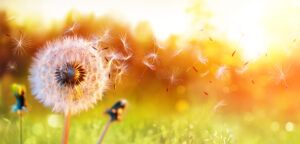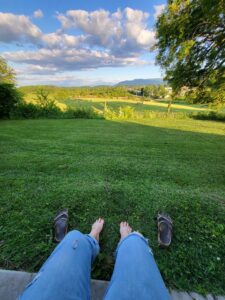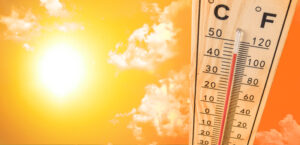Natural Treatments: Dietary Friends and Foes
About one-third of seasonal allergy sufferers have something called “oral allergy syndrome,” in which your immune system is triggered by proteins in some foods that are molecularly similar to pollen. Your immune system looks at the protein molecule and says, “Close enough!” and attacks it. If you are allergic to ragweed, for example, you may have cross-sensitivity to melons, bananas, tomatoes, zucchini, sunflower seeds, dandelions, chamomile, and echinacea. If you have a grass allergy, you may also react to peaches, celery, tomatoes, melons and oranges.
Besides avoiding foods that may trigger your allergy, there are a number of foods that can be helpful for calming down allergy symptoms.
Consider the following:
- Omega-3 fatty acids: According to Mother Earth News, a German study published in the journal Allergy found people who have diets rich in of omega-3 fatty acids suffer from fewer allergy symptoms. A second study in Sweden found that children who regularly ate fish prior to age one had much lower allergies by age four. My favorite sources of omega-3 fatty acids are grass fed meat and eggs, and krill oil. (Fish has become too contaminated to rely on as a staple.)
- Probiotics: In a 2008 study, researchers discovered that people who took probiotics throughout allergy season had lower levels of an antibody that triggered allergy symptoms. They also had higher levels of a different antibody (IgG), thought to play a protective role against allergic reactions. Other researchers found evidence that giving probiotics to newborns and mothers-to-be may help prevent childhood allergies.
- Vitamin D: Insufficient vitamin D levels have been linked to more severe asthma and allergies in children. Vitamin D has also been found to reduce allergic responses to mold. I usually recommend VItamin D3 5000 (125 mcg) iu gel cap once daily.
- Hot Peppers: Hot chili peppers, horseradish, and hot mustards work as natural decongestants. In fact, a nasal spray containing capsaicin (derived from hot peppers) significantly reduced nasal allergy symptoms in a 2009 study.
- Locally produced honey: Many believe that consuming locally produced honey, which contains pollen spores picked up by the bees from your local plants, can act as a natural “allergy vaccine.” By introducing a small amount of allergen into your system (from eating the honey), your immune system is activated and over time can build up your natural immunity against it. Just be careful to consume honey moderately as it’s high in fructose.
Below are herbs you might want to try:
- Quercetin: Quercetin is an antioxidant that belongs to a class of water-soluble plant substances called flavonoids. Although research is sketchy, many believe quercetin-rich foods (such as apples, berries, red grapes, red onions, capers and black tea) prevent histamine release—so they are “natural antihistamines.” Quercetin is also available in supplement form—a typical dose for hay fever is between 200 and 400 mg per day.
- Butterbur (Petasites hybridus)Another natural antihistamine, this herb has been used since ancient times to treat a variety of conditions, including migraines. In a German study, 40 percent of patients taking butterbur root extract were able to reduce their intake of traditional asthma medications. A British study found butterbur as effective as the drug Zyrtec. Recommended dosing is 150 mg daily
A word of caution is needed, however. Butterbur is a member of the ragweed family, so if you are allergic to ragweed, marigold, daisy, or chrysanthemum, you should not use butterbur. Also, the RAW herb should not be used because it contains substances called pyrrolizidine alkaloids that can be toxic to the liver and kidneys and may cause cancer. Commercial butterbur products have had a lot of these alkaloids removed.
- Stinging nettle (Urtica dioica): Stinging Nettle, another natural antihistamine, stinging nettle has a long history of use for seasonal allergies, without the drowsiness and dry mouth associated with many pharmacological antihistamines. Nettle inhibits your body’s ability to produce histamines. The recommended dose is about 300-500 mg freeze-dried nettle extract daily.
- Goldenseal (Hydrastis canadensis): Goldenseal may be helpful for seasonal allergies. Laboratory studies suggest that berberine, the active ingredient in goldenseal, has antibacterial and immune-enhancing properties. Recommended dosing 800-1000 mg daily.
- Eucalyptus oil: This pure essential oil can be healing to mucus membranes. You can apply a drop on a cotton ball and sniff it several times a day, add a few drops to water (or to a nebulizer, if you own one) for a steam treatment, or use a few drops in your bathwater.
Over the Counter Treatment Options
If OTC are needed, many non-sedative antihistamines are now available. These include, Zyrtec (cetirizine), Claritin (loratadine) and Allegra (fexofenadine). The newest non-sedative antihistamine option OTC available is Xyzal (levocetirizine). All meds are dosed one tab daily.
Nasalcrom nasal spray is also a good non-systemic choice. It stabilizes mast cells so that histamines are not released versus the action of blocking antihistamines that anti-histamines provide. Nasalcrom is not used as needed. You must use it daily for it to be effective.
Nasal steroid sprays are now available over the counter. Options include Flonase (fluticasone), Nasacort (triamcinolone) and Rhinocort (budesonide).
Other Tips For Making Allergy Season a Breeze
Another simple, inexpensive and very beneficial practice you can do at home is flushing out your nasal passages with a neti pot. A neti pot is a small vessel with a spout you insert into your nose that can be used to gently irrigate your nose and sinuses with a salt-water solution. You may want to also consider the purchase of an air purifier. Air purification will result in lower levels of allergens circulating around your home or office.
One of the best things you can do to reduce your allergy symptoms naturally is exercise. In a 12-year long German study, sedentary children had more than twice the rates of hay fever as active children. If you have seasonal allergies, you will also benefit from clearing out some of your “energy meridians” with an energy technique such as acupuncture or EFT.
In one study published in the American Journal of Chinese Medicine, acupuncture reportedly reduced allergy symptoms in ALL 26 participants. In a second study, just two acupuncture treatments totally eliminated symptoms in more than half of the participants. Even simpler is the Emotional Freedom Technique (EFT), which is my favorite energy technique because you can do it by yourself at home, and it’s easy to learn. EFT is “acupuncture without the needles.”
Lastly, remember to keep your vehicle and building windows closed on high-pollen days, especially in the mornings before 10 am when pollen levels are normally highest. Similarly, avoid using window fans when pollen levels are high. Pollen levels are also worse on dry and/or windy days. If you must do yard work, wearing a mask might be helpful. If you enjoy hanging clothing or sheets outside to dry, you may want to avoid this during allergy season as spores and pollen can cling to fabric and end up right next to your body, triggering symptoms.
A Few Things to AVOID…
- Avoid chlorinated pools and hot tubs if you have allergies or asthma. Swimming in chlorinated pools has been shown to increase respiratory problems and allergies.
- Want to clean your air ducts? Don’t bother. One study showed that no significant allergens accumulate in air ducts, so cleaning them is a waste of money. Instead, put the money toward a good air purifier.
- You might want to back off on cell phone use if your allergies are raging. A study out of Bastyr University found cell phones might actually worsen allergy symptoms. The study, published in Archives of Allergy and Immunology, found that one hours of continuous cell phone use exacerbates allergic responses to dust and pollen. Although the findings are preliminary, they suggest that microwave radiation may somehow make allergic responses worse.
Hopefully, I have given you a number of ideas to try that you might not have known about. It is always best to employ natural measures before harsh drugs, and fortunately, natural allergy treatments work quite well.
To determine your area pollen count, go to pollen.com.




